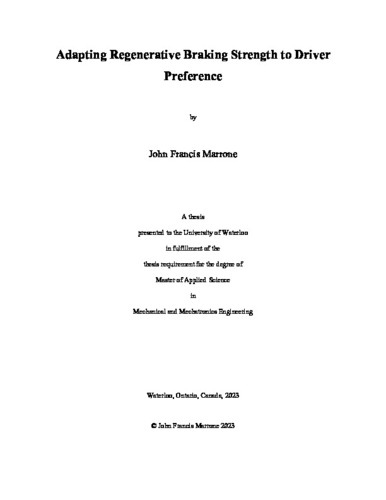| dc.contributor.author | Marrone, John Francis | |
| dc.date.accessioned | 2023-12-13 14:38:32 (GMT) | |
| dc.date.available | 2023-12-13 14:38:32 (GMT) | |
| dc.date.issued | 2023-12-13 | |
| dc.date.submitted | 2023-12-11 | |
| dc.identifier.uri | http://hdl.handle.net/10012/20158 | |
| dc.description.abstract | The modern automotive industry has witnessed a growing emphasis on adapting the driving experience to individual drivers. With the rising popularity of electrified vehicles, the implementation of regenerative braking systems, specifically lift-off regenerative braking, has become a focal point. However, research indicates that drivers often find the predefined deceleration response during lift-off regenerative braking to be undesirable. This thesis addresses this issue by developing an adaptive regenerative braking controller that learns driver preferences, thereby fulfilling the objective of enhancing the driving experience of lift-off regenerative braking systems by reducing driver fatigue through the minimization of pedal interventions. The research focuses on three critical aspects: accurate identification of driving conditions, acquisition of driver preferences for lift-off regenerative braking, and compatibility with real-time automotive hardware. By leveraging advanced techniques like HDBSCAN clustering, fuzzy logic inference, and online Q-learning, the research achieves accurate driving condition identification and adaptation to individual driver preferences in a control scheme that can be practically deployed in-vehicle. Real-world testing demonstrates the controller's 80.9 % accuracy in identifying driving conditions as well as its successful learning of the driver's preferred deceleration to within 1.9 %. Subsequently, the adaptive regenerative braking controller results in a 23.2 % reduction in pedal interventions during deceleration compared to a baseline that is representative of an industry-standard implementation of lift-off regenerative braking. This outcome underscores the controller's potential to alleviate driver fatigue and enhance the overall driving experience. This research contributes to the advancement of electrified vehicle powertrain control, focusing on improving driver acceptance and satisfaction with regenerative braking systems. | en |
| dc.language.iso | en | en |
| dc.publisher | University of Waterloo | en |
| dc.subject | automotive | en |
| dc.subject | machine learning | en |
| dc.subject | regenerative braking | en |
| dc.subject | electric vehicle | en |
| dc.subject | intelligent transportation | en |
| dc.subject | reinforcement learning | en |
| dc.title | Adapting Regenerative Braking Strength to Driver Preference | en |
| dc.type | Master Thesis | en |
| dc.pending | false | |
| uws-etd.degree.department | Mechanical and Mechatronics Engineering | en |
| uws-etd.degree.discipline | Mechanical Engineering | en |
| uws-etd.degree.grantor | University of Waterloo | en |
| uws-etd.degree | Master of Applied Science | en |
| uws-etd.embargo.terms | 0 | en |
| uws.contributor.advisor | Fraser, Roydon | |
| uws.contributor.affiliation1 | Faculty of Engineering | en |
| uws.published.city | Waterloo | en |
| uws.published.country | Canada | en |
| uws.published.province | Ontario | en |
| uws.typeOfResource | Text | en |
| uws.peerReviewStatus | Unreviewed | en |
| uws.scholarLevel | Graduate | en |

